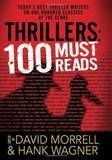Thrillers: 100 Must Reads / Edited by David Morrell and Hank Wagner
 Oceanview Publishing / July 2010
Oceanview Publishing / July 2010
Reviewed by: Martel Sardina
Thrillers: 100 Must Reads is a collection of essays written by today’s top thriller writers on the one hundred “best” books of the genre. For readers who are unfamiliar with the thriller genre, this collection provides a quick and easy way to find books that are worth reading. For current fans of the genre, this collection provides the opportunity to find out which books have inspired their favorite authors along the way. And for those writers aspiring to be the next Lee Child or David Morrell, this collection provides critical information about the craft behind each of the selected works. The deconstruction of plot and character, and analysis of such, is a virtual blueprint for writers seeking to pen stories of their own.
The “100 Must Reads” list was compiled by seeking the opinions of noted reviewers as well as members of the International Thriller Writers organization. While Morrell and Wagner readily admit that limiting the number of books selected for analysis was arbitrary, that does not mean that they did not go to great lengths to ensure that the books that were selected had a measurable impact on the genre. Those that were selected made the list by being groundbreaking in some way — subject matter, character type, writing style/technique, etc.
The list itself covers a wide range of fiction, starting in 1500 B.C. with Lee Child’s essay on the ancient Greek myth, “Theseus and the Minotaur,” and ending with Steve Berry’s take on The DaVinci Code which was published in 2003. There are also some unexpected choices on the list, books that this reviewer never thought of as thrillers per se, such as James Fenimore Cooper’s The Last of the Mohicans or Jack Ketchum’s Off Season, a novel that would probably be shelved in the horror section of many bookstores. However, the fact that Morrell and Wagner would broaden their horizons to include books that some might think to be outside their scope is actually proof that the editors carefully considered the merits of each of the titles that were initially suggested.
What made this collection of essays most interesting was the opportunity to find out which books today’s top thriller writers were passionate about and drawing comparisons between the books they chose to write about and that author’s own work. It’s no surprise to learn that J.A. Konrath is a fan of John D. MacDonald’s The Green Ripper. Or that Konrath believes that the character of Travis McGee is the “template for the modern day thriller hero.” However, having reading Konrath’s Jack Daniels mystery series, this reviewer can see the practical application of that template when Konrath created his series character, Lt. Jacqueline Daniels.
The essays are presented in a similar format. Essays average three pages long, beginning with some biographical information on the author of the selected work, moving into the critical analysis and wrapping up with a short bio of the essay’s author. The consistency in terms of format gave the collection a textbook feel. In addition, several authors that contributed essays to this collection (F.Paul Wilson, Lee Child, and Jeffrey Deaver, to name a few) have works that are also the subject matter of essays themselves.
Readers should be warned that many of the essays do contain spoilers. Writers who are looking to deconstruct stories to figure out what makes a “good” thriller work may not mind these revelations. However, casual readers and fans may want to steer clear of essays for books on their “to be read” list in order to avoid disappointment in the event some critical plot or character elements are revealed in the analysis of said works.
Morrell and Wagner have compiled a collection that is useful to both readers and those aspiring to write in the thriller genre. The only downside to reading this collection is the likelihood that your personal “to be read” pile will no doubt get larger as a result. But that’s a problem that can be overcome in time. And one that most readers won’t really mind.
Purchase Thrillers: 100 Must Reads, edited by David Morrell and Hank Wagner



